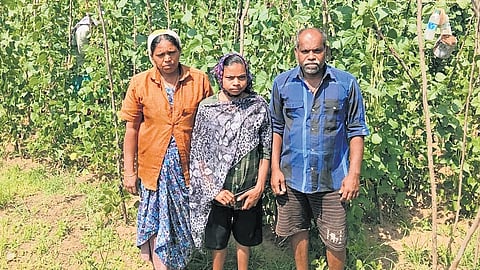

IDUKKI: Like all members of the Muthuvan tribe, Amrita Raj and his family also share a deep connection with their land.
Despite umpteen challenges, including frequent raids on their crops by wild elephants and birds, and water scarcity, the family of four – Raj, his wife Santhi and two daughters Sangeetha and Sneha – religiously carry out farming on their five acres of land close to the forest at Kundala near Munnar in Idukki.
For them, the land is their mother and source of livelihood.
“Ever since I settled at Kundala (Kundala Muthuvan Kudi) in 2001, farming has been our source of livelihood. While the Kundala reservoir is nearby, we use its water only for drinking purposes. Water that flows down from the nearby shola forest is used for irrigation,” he said.
During summer, Raj manages to store the water from the stream in an artificial pond that he created in the middle of his farmland. Raj largely cultivates butter beans, which is in high demand, besides other varieties, including bush and red beans.
In the past, in addition to the selection of crops that were suitable to their soil and weather, collaborative farming and direct marketing helped tribal farmers in Kundala earn good income.
Back then, the families worked together in the fields to cut down on labour expenses. Moreover, sale of their produce used to be carried out via ‘Krishithanal’, a collective of tribal farmers, which sold the beans directly in markets.
We bear losses due to fluctuation in prices and carry on: Farmer
“Barring Rs 2 per kg of beans charged as transportation cost, the rest of the money made after selling the produce went directly to farmers,’ said Raj, who was secretary of the collective.
However, crop raids by wild animals and birds, and water scarcity, forced many farmers to quit. “While fencing has been erected, wild jumbos find ways to enter the farmland and damage the crops. Besides, water from the shola is often not enough to irrigate the entire farmland. As a result, many farmers quit,” he said.
Since leaving their land was not an option, Raj and his family persevered.
“My family jointly carry out the farming. Harvested crops are sold directly in main markets in Kochi and Madurai, without the help of intermediaries. Though price fluctuations occur, we bear the losses and prepare for the next season,” he said.
Raj said he has set up solar-powered LED lights with the support of the agriculture department in his farmland, which has helped keep wild elephants away.
His eldest daughter, Sangeetha, 18, is a BA first-year student at Government Arts College in Munnar. She said she has set aside 40 cents of land for cultivating red beans this season, and has decided to do it by herself. “My father has promised to give the entire profit of my harvest to me,” said the 18-year-old, who believes that farming is as enjoyable as any other hobby.